Exponent II's Blog, page 50
October 3, 2024
The Primary Program is Optional
It’s the time of year when Facebook and Instagram are full of pictures of smiling children dressed in their Sunday best. The captions say things like, “My kids did so well in the Primary Program.” “I was so happy to hear their testimonies.” Or “I always cry when I hear my children sing the primary songs.”
I’m genuinely happy to see these posts. I’m glad that many parents and children enjoy the Primary Program. If you are one of those families – great! I’m happy for you, but this post is not for you.
I want to talk to the parents who have children who struggle with the Primary Program. I want you to know you are not alone. I want you to know that the Primary Program is optional. You can politely opt out of it.
This is my story. My four children don’t love to perform on cue. They do many amazing things. The catch is that they only do them when they want to do them, not when they are mandated. That means the Primary Program was never something they loved.
There were also some other issues at play.
My twin girls were often separated by well meaning leaders – this led to some major twin separation anxiety on display during the program. My son is on the autism spectrum. He staged multiple escape attempts during many Primary Programs – and was successful at least once. My youngest daughter had a panic attack on the stand at age six. Several years later she was diagnosed with Generalized Anxiety Disorder. I look back on that Primary Program as one of the first instances of her anxiety showing up.Even though I knew that my children had a difficult time with the Primary program, I used to feel like it was mandatory. I made them participate. I remembered to talk to Primary leaders about rearranging the seating chart if the twins weren’t together. Special helpers were called to manage my son and we came up with plans for where my son could sit so that he couldn’t get off the stand easily. I made my daughter participate even though she hadn’t done anything but glower during her first program as a Sunbeam.
The annual Primary Program was a rite of passage. My kids couldn’t miss that.
Or could they?
The 2019 Primary Program had been the one where my youngest had a panic attack when it was her time to say her part. She’d hyperventilated into the microphone and then ran off to the side crying. One of her older sisters comforted her as all the children sang “I’m trying to be like Jesus.” It was a really sweet moment that lots of people commented on. But as I reflected on it later I realized it was kind of crazy that I just let all that play out in front of me. Why hadn’t I got up and taken my crying six year old off the stand? Why did I feel like she had to stay up there?
Was the Primary Program really so important that I couldn’t take my children out of it even if they were having a bad time?
A year later COVID had shut everything down and so many things that had seemed important had changed; The temples were closed. Sacrament Meeting had been canceled for months and was only just getting started again every other week. The Primary activities were barely happening.
I realized that there probably wouldn’t be a Primary Program that year. I was surprised that I felt relief. I wouldn’t have to worry about my twins pouting over being separated. I wouldn’t have to figure out how to keep my son on the stand. And most of all, I wouldn’t have to worry about my daughter having a panic attack during the program.
My ward tried to put together some sort of video program. The leaders asked parents to send in videos of their children and someone put it together into a video. It sounded cute, but I wanted a break from the pressures of the program – even in video form. I never sent in any videos and my family never watched the final result.
The next year things were sort of back to normal and the children would be able to have a real Primary Program again. I was contacted by one of the leaders about having my children answer some questions that would be written into their part for the program.
I sent her this email. Part of if said, “COVID taught me that many good things are also optional. And for our family that means the primary program is optional.”

I’d braced for needing to justify my reasoning, so her reply back was a relief. She said, “Their choices are perfectly fine and we will honor them.”
That year was the last year my twins were in Primary. They participated in the Primary Program while my son and daughter sat on the bench. Everyone was happy with that.
That was the last year any of my children participated in the Primary Program. The twins moved up to Young Women. My son and daughter never wanted to participate again. The primary leaders were always understanding.
This year is my youngest daughter’s last year of Primary. I’m happy to say that she has come along way in managing her anxiety. She went to therapy for about 18 months and is much more confident in many areas of her life. She’s even in a theater class and is excited about an upcoming audition for the play she will do with her class. However, she’s not interested in doing the Primary Program.
The primary leaders know that she does not like to participate. I was still touched that one of them reached out this year. Here’s our brief exchange.

I think my favorite thing is that no one has ever demanded that my children participate in the Primary Program. They have been just fine with my kids opting out.
If you are a parent of children who struggle with the program I want you to know that you are not alone. Your children don’t have to participate in the program. They can opt out. They will still be loved and appreciated.
And really, isn’t love and appreciation what we are all looking for at church anyway?
October 2, 2024
Is it sacred or secret?
As a Marriage and Family Therapist, I begin my work with couples by having them sign what I term a “Limited Secrets Policy.” I explain that if at any time during my work with the couple I happen to be communicating with them individually- whether that’s over the phone, text, email, or an individual session- and they disclose a big enough secret that their partner is unaware of (ie. an affair, a secret bank account, etc…), we will need to address it. Either the secret is required to be brought up during the next couples session or I will discontinue couples therapy.
I make this clear one- because I’ve been burned before, and two- because holding a secret that 2 people know and 1 person does not can be detrimental to the therapeutic process and lead to feelings of betrayal.
I have found over my years of being a therapist that secrets can do significant damage in relationships, both for the person holding the secret and the person in the dark. Secrets, by nature, imply a lack of trust in the other person or a fear regarding potential consequences should the secret be revealed. They create a burden for the secret holder, often using more energy and effort than being able to tell the truth, and they impact the relationship for the person in the dark, even if they aren’t aware a secret exists.
I see the same problematic dynamics play out in certain areas of the church where members are told to keep ceremonies secret. Or when leaders are encouraged (forced?) to hold information such as various historical facts or church operations secret thereby keeping that information inaccesible from the average member. Though church leaders have warned members over the years about the dangers of “secret combinations,” there seems to be a tendency within the church to lean into secret-keeping.
But what if it’s sacred?Sometimes the church will require a secret under the guise of information being too “sacred” to share. While it makes sense to me that there is a time and a place for certain information, I wonder if this is too often used as a measure of control- whether that’s control over the information or the church member. It also comes down to trust- does the church trust its members enough to allow them to share their own sacred experiences when they feel it’s appropriate to do so? From what I’ve seen, the answer would be no.
Ultimately, I wonder how sacred an experience can be when a person doesn’t have autonomy over the memory of it?
An easy example of the harm secrets can cause plays out in the sharing of temple names. Women share their temple names with their husbands before marriage while men do not. This happens in the very first ceremony a soon-to-be-sealed couple takes part in, thereby beginning their marriage on a secret that is held by and tied to the church. The church knows the man’s name and the man knows the man’s name, but the woman does not, creating an unhealthy 2-1 dynamic. And like couples therapy, that 2-1 dynamic can create feelings of betrayal in the party that is left out and put added burden on the party that is in the know.
So why does the church require these secrets?One theory is called Costly Signalling. This theory proposes the idea that people within a group need ways to convey their “status” or commitment to one another and to people outside of the group. Requiring secrets, on some level, measures a person’s willingness to comply with the church’s expectations and requirements. The more secrets a person holds for the church, the more that person is committed to church. So by giving each member a temple name and then requiring secrecy regarding that temple name, the church is able to create commitment and status.
But the problem lies in the imbalance between the in-group and out-group. In the 2-1 dynamic created between men and women regarding their temple names, men are placed closer to the middle of the “in-group” and women are a step removed. This harms both men and women because men are burdened with a secret they may not even want to keep and women are left in the dark. Their marriage is stuck with the church right in the middle, governing whether this secret is allowed to be shared.
The temple name example is easy to point to when talking about the potential harms secrets can cause, but it’s not the only one. Many other secrets in other areas of the church cause significant harm to members, whether they are burdened with the secrets or in the dark. I wish the church would “teach correct principles and let them govern themselves”- even, or especially, in areas of more sacredness. Such sacred experiences should be up to the experiencer to share or not share.
Whether it involves information or sacredness, the church does a disservice to its members by requiring secrecy. The sacred environments provided by the church can be healthy and fulfilling, but the secrets are not.
October 1, 2024
Everything I Know About Leadership I Learned in Young Women’s
Despite my best efforts, I’ve managed to adult my way into new responsibilities at work (read: extra meetings). With an opportunity to originate and expand a position at my place of business, I’ve found myself reflecting on leadership and organizational structure.
Good leadership was modeled for me early and well in my YW years. I always held a spot in a YW presidency, attended those regular BYC meetings with agenda in hand, and saw how activities were coordinated from beginning to end. On top of getting an early feel for managing logistics, I felt empowered to lead.
The responsibilities of the job were ones I took seriously. In YW, I learned early how to pay attention to those around me, to offer support, to help, to listen. The value of stewardship – the care and love inherent in that role – was imprinted on my heart in those small opportunities to check in and see if someone was all right or to help where I could.
A leader leads by not just caring about the welfare of the people in their organization, but centering that welfare.
I’m grateful for those early lessons.
My expanded role at work has placed me in new rooms and at new tables. While I am very much the most junior person, hierarchically speaking, I still get to be in “the room where it happens.” I work with brilliant people who go out of their way to make sure I speak up, who mentor me, who build me up.
To say that I am anxious about these new responsibilities isn’t quite enough. I am terrified. But my coworkers’ consistent integrity and commitment to equity have unknotted something in my soul.
That a leader leads through gentle and kind attention to the welfare of their people is something I had somehow forgotten in my adult years.
That a leader leads by stepping back and making space for others is something I have long believed, but it’s something else to see it in action.
Being in spaces at work where I can observe the people above me valiantly defending our agency, our right to do our jobs well without excessive oversight or meddling, carving out the space to say no, to protect our dignity and peace is unfamiliar. Yet another unknotting in me, this time I realized I had forgotten what it felt like to not be fully at the mercy of those hierarchically above me.
I feel sorrow that the way I was shaped and supported in my youth callings dissipated upon reaching adulthood. As an adult, I have struggled to figure out how I fit in the church organization. It feels like one misstep after another. I’m both too little and too much for any one calling, but somehow always a disappointment.
I feel sorrow that the inspiring people I work with, who act with integrity, speak inclusively, strive for equity, had to heal what my experience with poor leadership in the church had broken in me.
I am still grateful for those early opportunities in my youth. The worth of souls was written deep in my heart in formative years, informing my life’s work. This is the good I take with me.
But as an adult, I cannot ignore the lack of leadership with integrity, with an emphasis on equity and inclusion, at church. I know how deeply I have been affected by people with more power and authority than wisdom in how to wield it, and I know I’m not the only one who has been affected so.
It’s too bad all of our general authorities, and bishoprics, and stake presidencies, and high councils, and area authorities missed out on the YW experiences that shaped my early understanding of leadership. There might have been some crucial lessons on leadership to be found there.
Photo by LinkedIn Sales Solutions on Unsplash
September 30, 2024
Comparing the Nightmare Before Christmas and the Nightmare of Joseph Smith’s Polygamy: Part 2
The feature image today is an imagined portrait of Joseph and some of his plural wives. While some of them liked the idea of having him as a partner, there was plenty of jealousy, loneliness, and confusion to go around. There was never s uch a portrait. Joseph was not public about his lifestyle. He swore adherents to secrecy and required they burn any documents about plural marriages (Mormon Enigma 95-115).
We shall continue our tales of gifted leaders experimenting on others for misguided reasons.
Both Jack Skellington’s and Joseph Smith’s plans are incompatible with the people they require carry them out, yet both act oblivious to this. They each move forward with enthusiasm despite their lack of understanding. Jack acts manic as he announces his plans to steal Christmas and delegates assignments to the inhabitants of Halloween Town. He happily sends fiendish trick or treaters to kidnap Santa without considering how Santa will feel (he self-deceives by saying it will be a nice break for Santa). In a comparable series of events, when Joseph gave the news to the Twelve Apostles they’d be required to change their marital lifestyles, he “clapped his hands and danced like a child” out of relief he wouldn’t be the only one taking the lead on plural marriage anymore. He was strangely aloof to the pain his friends felt as they tried to accept his mandate to betray their spouses. He refused to heed pleas to lift the requirement (Mormon Enigma 98).
 Imagining Joseph dancing and leaping for joy while his friends become depressed.
Imagining Joseph dancing and leaping for joy while his friends become depressed.Despite Jack’s efforts at training, the people and creatures of Halloween Town never get out of the mindset that holiday making is about invoking fright, horror, and disgust. They are simply not suited to become Christmas creators. Neither were early Mormons compatible with polyandry or polygamy. Plural marriage was offensive to the values, beliefs, and desires of Joseph’s highly moral followers, not to mention the law. Ultimately, incompatibility is a major reason why both plans backfire. The horrific and dangerous gifts made by Jack’s followers lead parents to set the military on Jack. Enraged Nauvoo men denounced Joseph as a “base scoundrel” practicing “whoredoms and abominations” in the paper they published that set off a domino effect of unrest and retribution that would lead to Joseph’s death (Mormon Enigma 181-2)
Both Jack and Joseph are warned by the women who love them, but fail to take them seriously. Both women fight against their plans. Jacks’ would-be lover, Sally, sees a vision of a Christmas tree that catches fire, an omen of disaster for Jack’s Christmas Eve takeover. Jack is willfully deaf and chooses to misinterpret what she says in effort to pressure her to sew him a Santa suit. Sally ends up reluctantly completing the project. Yet her willingness to cooperate fades. Hoping it will make Jack’s scheduled sleigh ride impossible, she creates artificial fog out of ghoulish kitchen ingredients on Christmas Eve.
A similar pattern of interactions happened between Emma and Joseph. At a couple points, Joseph coerced Emma into getting on board with his plural marriages by withholding priesthood ordinances unless she consented. Emma’s submission never lasted long. Anger, jealous rage, and convictions plural marriage was immoral returned (Mormon Enigma 140-71). Emma threatened divorce (158). She also initiated the publication of “The Voice of Innocence,” a treatise that denounced plural marriage practices authored by the Relief Society. She urged women to only heed Joseph’s public teachings about marriage (monogamy) rather than what he shared in private (174).
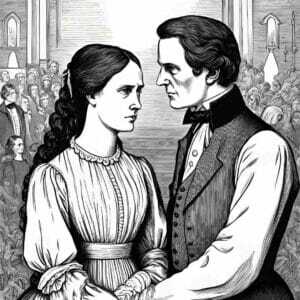 Emma’s submission never lasted long, sometimes only a few hours
Emma’s submission never lasted long, sometimes only a few hoursJust as the gifts that Jack leaves cause sadness and confusion, Joseph dispersed botched blessings of disappointed hopes, loneliness and thwarted agency. On Christmas Eve, Jack leaves toys that can move and attack in the homes of unsuspecting children, such as vampire dolls, shrunken heads, ducks from hell, and giant snakes. He cackles like a witch as he flies through the sky pulled by his skeleton reindeer team, seemingly oblivious to the fact he is ruining Christmas.
Joseph’s teachings were packaged as blessings of joy, worthiness, and assured heavenly exaltation, but were largely experienced as curses. They led to depression, confusion, broken relationships, resentment, and lost faith. Joseph caused people who hoped for happy, exclusive marriages to have their dreams dashed. Women faced lonely situations laced with disempowerment and bitterness (see In Sacred Loneliness by Todd Compton). Sometimes Joseph’s exploits led happy couples to be separated, such as Zina Diantha Huntingdon and Henry Bailey Jacobs (The Ghost of Eternal Polygamy 92-94). Like Jack, Joseph seemed insensible to the devastation and suffering in his wake as he initiated yet more and more illegal unions during the final years of his life.
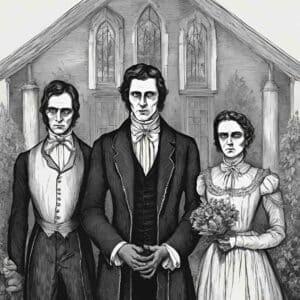 Joseph intrudes on a couples’ marriage by marrying the wife. He sometimes used the idea of premortal romance and marriage that trumped earthly unions as a justification for polyandrous relationships.
Joseph intrudes on a couples’ marriage by marrying the wife. He sometimes used the idea of premortal romance and marriage that trumped earthly unions as a justification for polyandrous relationships.While Joseph’s spiritual gifts brought delight to Emma, his plural marriages were unwanted, traumatic surprises. His habitual pattern was to keep Emma in the dark as much as possible. He was fully aware that she disapproved of such behaviors and that his infidelity caused her great suffering. The pattern was that Emma would stumble unexpectedly on his liaisons and hear rumors from others. “Emma came to it piecemeal over a number of years through circumstances that hurt and shocked her” (Mormon Enigma 100). She discovered he was married to some of her closest friends, some of whom had been living in their house. He did not discuss his plural marriages directly with her until he could no longer avoid it. His actions harmed important relationships for Emma and alienated her from the community (95-100, 112-120, 132-51). Often being the last to know her own husband was in intimate relationships with the people around her was humiliating and abusive. Memories of Joseph’s acts of betrayal remained deeply painful and almost impossible for Emma to talk about in later years (Mormon Enigma 303).
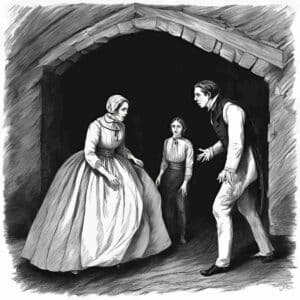 Emma receives an unpleasant surprise as she stumbles on Joseph connecting with another woman.
Emma receives an unpleasant surprise as she stumbles on Joseph connecting with another woman.Jack and Joseph both hit low points when they recognize their mistakes. When shot down out of the sky by the military for being a “Santa imposter,” Jack falls into the arms of an angel memorial in a graveyard and comes to acknowledge his mistakes for what they are, asking “what have I done?”
Hugh Herringshaw claimed Joseph Smith told the Twelve at a meeting that he had made a mistake in instigating polygamy and wanted their help to reverse it. William Marks wrote that Joseph told him personally he came to the realization he was deceived and had caused ruin for his people (Mormon Enigma 179-80, see also this article by Laurence Foster). This might indicate that Joseph hit a kind of rock bottom when the negative consequences of his dysregulated habits and self-justifications came to far outweigh the seeming advantages, leading him to get more in touch with reality concerning plural marriage.
 Joseph hits a low point and regrets his course.
Joseph hits a low point and regrets his course.Christmas is saved because Sally takes action, but polygamy stands uncorrected because Emma and other women have been disempowered. Santa and Sally team up to free themselves from a sadistic monster, Oogie Boogie, so that Santa can clean up Jack’s disaster. Jack returns from the human world and humbly joins their cause. Before he leaves to save Christmas, Santa remarks that Jack should consult Sally should he get any more creative ideas. Her independent thinking and actions prove essential in setting things right.
Brigham Young managed to keep some saints unified after the chaos of Joseph’s death, but he was also determined to continue polygamy. While he had “desired the grave” when Joseph first required that he take plural wives (Mormon Enigma 98), Brigham had come to enjoy his polygamous lifestyle. Once good friends with Emma, Brigham became her critic and antagonist across the rocky mountains (Mormon Enigma 205, 283-6). Brigham defended Joseph in past instances in which he had condemned Emma in public (284). Heber C. Kimball denounced Emma as a damned soul who could only be released from hell by her upstanding, honest husband (270). You could cut through bias and misogyny with a knife. The narrative about polygamy we have inherited in The Church of Jesus Christ of Latter-day Saints was passed down by Brigham and other self-justifying, powerful male polygamist leaders. To this day, the Church continues to ignore women’s critical feedback and pain about polygamy.
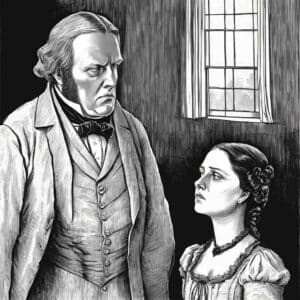 Brigham Young is closed off to Emma’s critical perspective of plural marriage and judges her as unfaithful to the Church and to God.
Brigham Young is closed off to Emma’s critical perspective of plural marriage and judges her as unfaithful to the Church and to God.Jack and Sally move toward a partnership in which they see eye to eye, something Joseph did not live long enough to possibly fulfill. In the Church, we have yet to treat Emma’s perspective of polygamy with the respect it deserves. In the closing scene, Jack calls Sally “my dearest friend” and asks if he can join Sally at her side to gaze into the stars together. His gestures acknowledge he overlooked her efforts to get close to him and to warn him of his previous self-absorption. Now he sees that warmth, joy, and love he seemed to be searching for in Christmas can be fostered in a relationship with Sally.
Joseph died without setting things right with polygamy or fully repairing his relationship with Emma. Emma’s final position was that while her husband was an authentic prophet, polygamy did not stem from God (Mormon Enigma 272). Neither the D&C 132 text nor the practice brought any spiritual light. Plural marriage was a dud revelation. Joseph himself acknowledged he had false “revelations” from time to time that came from humans or devils (30). If Emma could handle this level of nuance in the 1840’s, I don’t see why we couldn’t today. As the closest witness to Joseph’s life, a key founder of our faith, and someone forced to live the practice herself, we ought to let her perspective carry much more weight. Misogyny and male dominance have been major obstacles to her perspective making an impact on the Church or women’s lives.
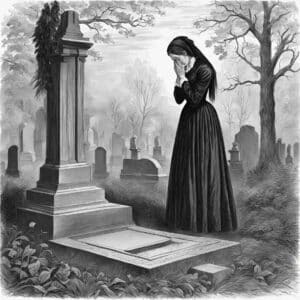 Memories of Joseph’s many acts of betrayal remained deeply painful and difficult to talk about throughout the rest of Emma’s life (Mormon Enigma 303).
Memories of Joseph’s many acts of betrayal remained deeply painful and difficult to talk about throughout the rest of Emma’s life (Mormon Enigma 303).The nightmare ends for Jack’s people, but has not truly ended for us. Jack’s people get a happy ending. Jack has grown and learned from his mistakes and returns to his role with newfound gratitude. Christmas snow falls on Halloween Town thanks to an act of grace from Santa.
Yet The Nightmare After Polygamy continues on for us after over 180 years. The emotional detachment, hubris, and abuses of power that Joseph Smith modeled foster the same vices in our leaders’ approaches and policies today. The fallout of polygamy goes far beyond plural marriage proper, which lives on in our scriptural canon and sealing policies. Its legacy has made our Church rigid, biased, overconfident and anxious about sex, marriage, and gender roles, wielding priesthood authority over members, and the treatment of those who are sexually different.
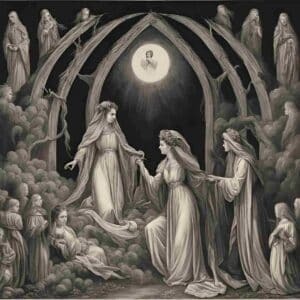 Victorian brides reluctantly enter their eternal rest as polygamous wives. An unwanted afterlife that LDS women continue to dread today.
Victorian brides reluctantly enter their eternal rest as polygamous wives. An unwanted afterlife that LDS women continue to dread today.Rejecting polygamy from the roots is more congruent with Latter-day Saint scripture than continuing to give it an honored seat at the table. The Book of Mormon warns that it is all too easy for men to come to believe the Bible gives them permission to have plural wives or concubines like David and Solomon (Jacob 2). Thoughtful writers have pointed out that even the supposed “exception clause” in Jacob 2:30 proves to be misinterpreted when you look carefully at the word choice, phrasing, and sentence structure. It’s just another statement that affirms that what God commands is monogamy. One of the overarching messages of the Book of Mormon is to repent and turn away from the wicked traditions of our fathers. The book also cautions us to beware of religiously-based justifications for sin and arrogance. Our Church fails to hear and respond to our own scriptures’ calls to repentance.
Jack’s mistakes are resolved through him choosing accountability for his errors and switching from leader dominance to a partnership with Sally. Likewise, the Church will only make polygamy right when it steps up to take full responsibility for the wrongs it has inflicted, and transitions to a partnership model in which women’s authentic voices are truly heeded and come to impact Church narratives, teachings, and policies just as much as men’s do.
When will our leaders’ bubble of apathy and arrogance toward the suffering of women, marginalized groups, and lay members burst? When will women and men, and leaders and members come to sit side by side as equals, having moved past the fantasies and threats of polygamy toward partnership and reciprocity? Will it take unignorable, relentless outcry against human rights violations and psychological and spiritual abuse done by the Church over the past 180 years? I’m noticing many voices assert that it’s impossible for us to really start healing or making any real spiritual progress as a people until we weed out polygamy from its roots from our theology, scriptures, thinking, and policies.
September 29, 2024
Comparing the Nightmare Before Christmas and the Nightmare of Joseph Smith’s Polygamy: Part 1
There once was a gifted and powerful king who inspired awe and adoration. Yet the king grew weary of the same old praise and began to feel empty inside. He wanted something new.
While wandering one night, he stumbled upon a strange place. The customs were difficult to make sense of. He didn’t understand them, but found them alluring. He hoped they would satisfy his desire for something more. He made it his personal mission to bring these conventions to his own kingdom.
He returned home and commanded his people to enact his vision. Some tried to share his enthusiasm. They trusted the King’s judgment over their own. Yet what he demanded felt unnatural and wrong.
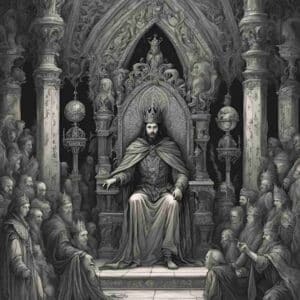 A king commands his people to enact a personal whim
A king commands his people to enact a personal whimThe king’s actions pained his queen. She warned his path would lead to ruin, but he wouldn’t listen. He continued altering his kingdom’s culture and trampling on the desires of his subjects. Unrest led some to seek his life, and he was shot down.
So goes the plot of The Nightmare Before Christmas. This folktale-like narrative also works as a retelling of Joseph Smith’s polygamy. Jack Skellington’s story drives home an important point: leaders can make big, harmful mistakes, even when they are strong in many areas. Whether Jack really is “the Pumpkin King” is never the problem. The crisis is that his gifts and legitimacy do not make him immune to hubris. Jack develops an obsession and makes self-deceptive choices. Joseph’s prophetic gifts likewise did not eliminate character flaws or mistakes. We can reject Joseph Smith’s claims to a divine sanction for plural marriage without this being irreconcilable with a genuine prophetic role.
 Whether Jack Skellington really is “the Pumpkin King” is not the problem. Because his story is about a gifted leader who makes a major, foolish mistake, the film is an intriguing point of comparison for examining Joseph Smith’s troubling relationship with plural marriage.
Whether Jack Skellington really is “the Pumpkin King” is not the problem. Because his story is about a gifted leader who makes a major, foolish mistake, the film is an intriguing point of comparison for examining Joseph Smith’s troubling relationship with plural marriage.While Jack’s story grapples with his errors openly, in official Church narratives, Joseph Smith is protected from scrutiny. Our stagnant narrative leads to confusion, bifurcation and loss of faith across the Latter-day Saint spectrum. Some members deny Joseph practiced polygamy at all, others defend it, some are weighed down by it, and others quietly condemn it. Meanwhile, many who disaffiliate have come to assume Joseph Smith was a sexual predator and fraud. Loss of trust in him and perceptions that the Church has not dealt with his plural marriage teachings and practices in a thoughtful or accountable way has harmed many individuals.
Wouldn’t we all like to be at least a bit more unified about the kind of person Joseph was, what he actually did, where he contributed genuine goodness and where he overstepped? Could we, as we find in Jack’s narrative, come to treat our founder’s scheme as an exception to otherwise reasonable and honorable leadership rather than something that would require discarding all his contributions if invalid?
The truth about Joseph Smith’s character and motivations is likely complicated and lies somewhere in the middle of our polarized and unsettled views. To address the bifurcation, the Church needs to cease clinging to the stale, dogmatic narrative and open up to contemporary reinterpretations. This turn toward greater humility and adaptation is desperately needed in official Church spaces.
Religious communities’ stories need to be retold over time to stay relevant, and this is nothing new. The ancient Greeks understood this in their ongoing redevelopments of their mythology. The long legacy of reinterpretations in Jewish faith also demonstrates that re-thinking stories is key to keeping traditions burning bright. We need retellings of Joseph Smith’s polygamy that are more historically, psychologically, and theologically sound than those of the past. I offer this essay as one pop culture-influenced version that is perfect for Halloween time. My main source is the 1994 edition of Mormon Enigma, the definitive biography of Emma Smith. It offers a unique, carefully researched, and distinctly feminine perspective of Joseph’s plural marriage teachings and practices and his interactions with others. The illustrations for these posts were created using Canva’s image generator. As the essay unfolds, I will draw several comparisons between Jacks’ and Joseph’s stories.
To being with, Jack and Joseph are both venerated leaders who develop unchecked desires stoked by their personal struggles. Jack acknowledges that his talents as the King of Halloween are “renowned far and wide,” but he’s “tired of the same old thing,” projects for which the objective is to send shivers down peoples’ spines. The “fame and praise” continue as strong as ever, but no longer help him feel fulfilled. He has grown lonely, purposeless, and depressed. At the end of a sleepless night wandering in the woods, Jack stumbles upon a circle of trees with entrances to other holiday worlds. He enters a colorful Christmas tree-shaped portal. After a brief taste of Christmas Town, he becomes obsessed and later comes to believe taking it over as his own domain is the perfect solution for his ennui.
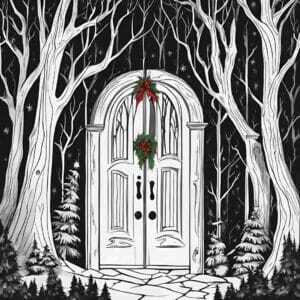 Jack haphazardly finds an entrance to an unknown holiday world and decides taking this world for himself is the answer to his loneliness, boredom, and depression.
Jack haphazardly finds an entrance to an unknown holiday world and decides taking this world for himself is the answer to his loneliness, boredom, and depression.Joseph Smith had impressive capabilities and theocratic power over his followers. Did he start feeling empty, bored, or disconnected like Jack? Did he crave power and devotion beyond what anyone should have as he tried to cope with a high-stress life or feelings of inadequacy? Joseph, like Jack, appears to have grasped for happiness, comfort, and satisfaction in the wrong places.
Not unlike how Jack stumbles on Christmas and tries to use it to solve private problems, Joseph stumbled on polygamy and perceived it as a fix for a personal issue. In 1835, he was struggling with extramarital desire for a woman living in his home as a servant, and also retranslating the Bible. He came to believe the precedent of men taking multiple wives in the text provided him with a justification to marry another woman illegally. Joseph’s proposal to Fanny Alger mentioned desire rather than revelation (The Ghost of Eternal Polygamy 67). The D&C 132 text also identifies desires for additional partners as the context of Joseph’s plural marriages, stating: “[I]f any man espouse a virgin, and desire to espouse another… then is he justified (v. 61, emphasis mine). Emma perceived the desires Joseph expressed as “indulgent” (Mormon Enigma 153).
 Joseph brings personal struggles to the Biblical text
Joseph brings personal struggles to the Biblical textThe Church narrative focuses on the idea that plural marriage was an unexpected mandate from God about which Joseph felt reluctance. Times of ambivalence did happen. The problem is, the Church turns a blind eye to the evidence that it was more psychologically complex than this. We assume that if any reluctance was present, this is a kind of proof it never could have been Joseph’s idea or a false revelation in the first place. However, alongside ambivalence and doubts, there was even more enthusiasm, desire, and curiosity on Joseph’s part. When we look at the historical details, we find that Joseph’s plural marriage-related thinking and behaviors were the result of an accumulation of ideas that enticed him over the course of several years rather than revelations that he did not want or expect.
Joseph had actually started to express interest in the idea of taking additional partners a few years before Fanny Alger. In 1831, he said he felt inspired that he and other already-married male saints should marry indigenous women, “that their posterity may become white delightsome and just” (Mormon Enigma 65, In Sacred Loneliness 47). In the same year, he told 12-year-old Mary Elizabeth Rollins that someday she should be his; this grooming resulted in her marrying him years later (Mormon Enigma 65). Thus some of his earliest instances of “inspiration” to instigate plural marriages were rooted in racist sentiments and impulses to give attention to underage girls.
Joseph’s three angelic visitation accounts, still treated as bulwarks of the Church’s defense of the divinity of plural marriage teachings, are not as credible or compelling as traditionally held to be. There are no contemporaneous or first-hand records of the experiences, and it is problematic that the accounts we have suggest that Joseph used the experiences to manipulate others and defer responsibility for his behaviors to God. In some cases, he appears to have shared these visitation accounts specifically to pressure women who had already rejected his proposals of marriage (The Ghost of Eternal Polygamy 92-3; Mormon Enigma 110-1, 146-7).
Considering that the commandment from the angel required breaking the law and the ten commandments as well as harming Joseph’s and others’ family relationships on pain of death, what Joseph experienced was not congruent with the loving and benevolent God he encountered in other instances. These “angel” experiences could have easily been caused by a deceitful spirit or a self-justifying delusion. They are strange outliers to his visionary experiences in that they are they the only instances of “forceful admonishment.” It’s hard to think of anything evil would find more useful than for betrayal, adultery, and sexist, unhappy, non-consensual marital structures to be codified as sacred aspects of the restoration of priesthood ordinances.
 Joseph’s angel with a fiery sword account was used to make polyandry and polygamy appear as mandates from God to reluctant women and families
Joseph’s angel with a fiery sword account was used to make polyandry and polygamy appear as mandates from God to reluctant women and familiesThere are many other pieces of evidence–beyond what I can share in these posts–that Joseph’s personal thinking, desires, and emotional struggles rather than God’s will were at the roots of polygamy. Joseph brought his personal romantic thoughts and feelings into the practice. For example, he used the concept of “kindred spirits,” which theorized that some people belonged to each other in the premortal life, to justify forming polyandrous unions (In Sacred Loneliness 37-8). His interest in plural marriage escalated into a fixation such that he didn’t speak of much else in private during the last year of his life. It had become central to him both religiously and emotionally (23). Surely it should be concerning to us and our current general leaders that polygamy became a kind of idol that eclipsed Jesus Christ and his gospel for Joseph during his final years.
Why did plural marriage become such an obsession for him? Valerie Hamaker suggests that Joseph suffered from avoidance of his “shadow” or the unconscious parts of him that didn’t match how he wanted to perceive himself as an upright prophet of God. She explains, “[Joseph] didn’t make sense of his own underdeveloped shadow struggles with women, with power, with patriarchy, [or] with sex.” And “when we deny our shadow, it starts to take over, and then we do all sorts of very creative things to make that which is not okay, okay.” Polygamy was a consequence of Joseph deceiving and justifying his desires and actions in effort to avoid working through his personal weaknesses (see “The Shadow Side of Joseph Smith’s Polygamy”).
 Joseph walks away from his shadow struggles to avoid dealing with them. However, avoidance gives them power to take over, much like in Hans Christian Anderson’s “The Shadow”
Joseph walks away from his shadow struggles to avoid dealing with them. However, avoidance gives them power to take over, much like in Hans Christian Anderson’s “The Shadow”Perhaps Joseph, like Jack, became obsessed with things he should not have precisely because of nagging dissatisfaction. In Joseph’s case, this dissatisfaction seems not to have been with his leadership role as it is for Jack, but rather with himself. Disordered intimacy is comorbid with self-contempt and shame. Certain early life experiences, such as feeling unwanted in one’s family, and situations that combine humiliation, futility, lust, and anger can lead individuals to struggle with impulses to seek out excessive intimate partners and experiences.
Acting on such impulses only reinforces self-contempt and serves as an unconscious way of staying connected with deep-set feelings of inadequacy, creating vicious cycles. For a full explanation of the psychology behind this, I highly recommend Unwanted by Jay Stringer. Joseph certainly did not lead a life free of shaming experiences, frustration or anger. Relational and emotional struggles could have easily been at the root of his behaviors and ideas when it came to plural marriage. If Joseph had impulses to seek out excess intimate connections in times of personal strain, this could help explain why he justified spending so much time pursuing intimate relationships in a life chock full of stressful projects, financial instability and transience, strained relationships, disease, loss and grief, arrests and imprisonments, and mob persecution and violence.
Jack’s and Joseph’s approaches to experimentation are ill-suited and do not yield knowledge. After returning to Halloween Town, Jack locks himself away in his study for days, neglecting friends and responsibilities to devote all his time to the study of Christmas. He attempts to decipher its mysteries and meanings by experiments such as dissecting teddy bears, smashing ornaments and boiling them, and observing smashed holly berries under a microscope. Yet the understanding he seeks simply cannot come through such methods. At the end of his experiments, even he acknowledges he still doesn’t get it– the spirit of Christmas has slipped through his “bony fingers” and there is much he cannot grasp.
Joseph’s experiments in studying polygamy were just as poorly designed and violent. His object of study was the Bible, and Joseph’s interpretation was sloppy. Contrary to D&C 132, where we find his thinking about polygamy, Isaac never had plural wives and the biblical text never recounts prophets being commanded to practice plural marriage. Polygamy was just one of the non-religious, worldly aspects of ancient cultures. A harem was a ubiquitous symbol of royalty, power, and wealth. The Old Testament makes clear that the law for Israel’s Kings was monogamy, as laid out in Deut. 17:14-17, which states: “Neither shall [your king] multiply wives to himself, that his heart turn not away.”
Joseph’s reading ignores the Bible stories in which polygamous relationships create schisms, unhappiness, and jealousy. He didn’t notice the accounts of men repenting from taking excessive partners as part of their journeys toward God. Instead of basing his insights on the text, it is as if he created his own mini mythology in D&C 132 about polygamy being a commandment and priesthood rite among ancient prophets. Joseph’s reinvention of biblical polygamy requires a great leap of faith; his ideas are only really supported in the passage he produced himself in section 132. Despite all this, the Church continues to affirm his stance that Biblical prophets and people were commanded by God to practice polygamy as an exception to God’s standard law for marriage in a Gospel Topics Essay. The supposed divinity of biblical polygamy is a second major bulwark of Latter-Day Saint polygamy that proves flimsy.
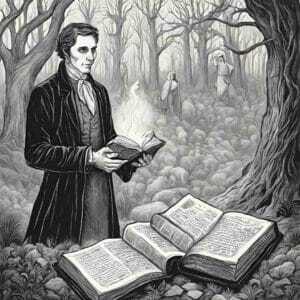 Joseph treated the Biblical text as if it had content about polygamy that simply isn’t there. Polygamy was against the religious laws for Israel’s Kings and simply part of non-religious ancient practices for wealthy, powerful men. It was driven by economics and lust, not faith or revelation.
Joseph treated the Biblical text as if it had content about polygamy that simply isn’t there. Polygamy was against the religious laws for Israel’s Kings and simply part of non-religious ancient practices for wealthy, powerful men. It was driven by economics and lust, not faith or revelation.Joseph failed to grasp the true spirit of love and marriage just as Jack failed to capture the spirit of Christmas. In section 132, women are treated as objects to possess. If women decline to consent to their husbands marrying other women, they are, most absurdly, to be destroyed by unidentified means. Women’s consent or non-consent amounts to nothing. Joseph couldn’t uncover spiritual light while writing the polygamy verses of section 132 because he had a predetermined agenda to control Emma, cover his personal sins, and gratify his pride (D&C 121:37-41).
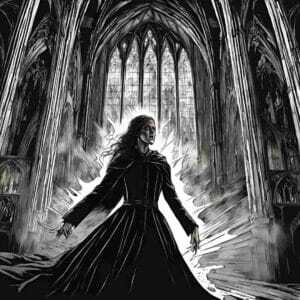 Imagining Emma Smith being mysteriously destroyed by God. Emma ultimately did not consent to Joseph Smith’s plural marriages and demanded he separate from his illegal spouses. She lived a lot longer than him and had a joyful dream about reuniting with deceased family members before her death (Mormon Enigma 303). Her supposed destruction proved to be an empty threat. Joseph, on the other hand, was murdered by a mob partly in consequence of his polygamous teachings and lifestyle.
Imagining Emma Smith being mysteriously destroyed by God. Emma ultimately did not consent to Joseph Smith’s plural marriages and demanded he separate from his illegal spouses. She lived a lot longer than him and had a joyful dream about reuniting with deceased family members before her death (Mormon Enigma 303). Her supposed destruction proved to be an empty threat. Joseph, on the other hand, was murdered by a mob partly in consequence of his polygamous teachings and lifestyle.Like the angel with the sword account, there are specific reasons to treat section 132 as a rejection-worthy outlier to Joseph’s other revelatory experiences. For one thing, Joseph usually used the Urim and Thummim to aid his process of receiving revelation, but in this case, he chose not to. He explained to his brother Hyrum that the content was already in his mind (Mormon Enigma 151-2), almost as if he had already decided he didn’t really need God’s input. Joseph usually intended revelations to be shared to benefit others in his community, but he intended D&C 132 to be only for Emma’s eyes. It was actually an indiscretion on the part of later Latter-day Saint leaders to publish and canonize it. Usually, Joseph recorded revelations contemporaneously, but he recorded section 132 over ten years after he started having impressions about plural wives and several years after he started experimenting with the practice.
Joseph’s experiments with writing scripture about polygamy seem intended from the outset to justify and enable his personal desires and behaviors, however unconscious this probably was. This was selfish and immature. Joseph was a caring, compassionate, gifted, and inspiring leader in many other instances and areas that I can’t cover in these posts, but not when it came to plural marriage.
We will continue the comparison between Jack’s and Joseph’s tragic schemes tomorrow. Will the stories continue to work in parallel, or will they diverge in the end?
September 28, 2024
Let’s Reframe the Narrative: Endure to the end sounds too depressing
This was a Sacrament Meeting talk given by the author on September 15, 2024 in Eugene, Oregon
Doctrine and Covenants 14:7: “And, if you keep my commandments and endure to the end you shall have eternal life, which gift is the greatest of all the gifts of God.”
This scripture sounds great. Keeping God’s commandments and enduring all the way till the end will give us the greatest gift imaginable.
I think there was a time in my life where I could solidly imagine what I thought this great gift of eternal life would be like and a scripture like this may have been a motivating factor for me to keep the commandments.
But, I’m not sure what’s happened – probably a mix of the grind of raising three kids and balancing all of life, my own intellectual and spiritual development, and experiencing very low periods of postpartum depression after having babies – but somehow today I cannot imagine this eternal life. So, without being able to imagine that, this scripture doesn’t actually motivate me. It’s too vague. My imagination is too foggy. I just can’t make decisions today based on what I try to imagine something in the very distant future might feel like.
Sometimes my thoughts wander to things more like this: “Endure to the end so that I can have eternal life – someday? But what about my problems today? What about comforting my teenager through difficult friend problems? What about being screamed at by my three year old because I gave her the blue cup instead of the purple cup? What about the imposter syndrome I’m always feeling at work? What about the unexpected bills that seem to pile on – like last month when I showed up at the dentist for a toothache and they told me it was cracked all the way through and they’d need to pull it out right then and, by the way, the replacement would cost $3500? What about? What about? What about?” And those are the days when I’m just focused on myself in the moment and things are going relatively well. Other days I’m thinking about bigger problems – wars, poverty, racism, sexism, LGBTQ+ discrimination – and what role I can play in making the world a little bit better. The idea of a far off future of eternal life just sounds too far off when I’m dealing with the mundane and the big problems of today.
So today, rather than talking about “enduring to the end,” I want to talk about “enduring to the end…today – just one day at a time.”
If this resonates with you on any level, this talk is for you. If this doesn’t resonate with you, well – put yourself in others’ shoes and take a moment to realize that it might be resonating for the person sitting next to you.
Let me start by testifying of my belief that Christ loves us. Christ loves us so much that He is there for you during the big trials that life throws: through sickness and grief and loss and tragedy. But he’s also there for you at 6pm on a random Tuesday night when you’re stressed about something that happened at work and you’ve been driving carpools and are struggling to get dinner on the table and your three year old is screaming about needing the purple cup. He’s also there for you when you wake up at 3am nervous or anxious or worried about something that needs to be done that day. He’s also there for you when you worry about whether a decision you are making, or maybe have already made, is the right one for your family. Christ is there for me and for you through all of this. Christ loves us.
So, for me: enduring to the end really has nothing to do with me thinking about some end that I struggle to imagine. Instead, enduring to the end means learning how to feel Christ on those stressful random Tuesdays when the purple cup threatens to push me over the edge. It means learning to rely on Christ to help me make decisions for my family. It means learning how to rely on Christ to help me when I realize I’ve made a decision that I need or want to change. It means learning how to rely on Christ when I’m wanting to develop my relationships with my family or friends. It means learning how to rely on Christ when I’m seeking forgiveness. More succinctly, for me, enduring to the end means learning how to love the Savior who loves me.
Recently I read the lyrics of one of the new hymns that has just been added to our hymnal and they really spoke to me as they apply so much to my thoughts on learning how to love the Savior. Hymn 1008 called “Bread of Life, Living Water” written in 2011 by Composer Annette W. Dickman.
Before I read the lyrics to you, I want to share a little bit of background about the song. According to the SL Tribune: “Composer Annette Dickman said the inspiration for her creation, “Bread of Life, Living Water,” sprang from her private worship. “I wrote this hymn for me,” she said in a news release. “I had been studying and pondering a lot about the sacrifice of Jesus Christ, and particularly how it related to me personally. I wanted to develop a closer relationship with him.”” (https://www.sltrib.com/religion/2024/05/30/six-years-after-lds-church/)
So now, as I read the lyrics, I’d like you to think about how Christ’s sacrifice relates to you personally. Here are the lyrics:
1. Jesus offered up His body on the cross in bitter pain. Freely He gave up His life so that we might live again.
2. In the garden Jesus suffered ev’ry sin and ev’ry woe, Bleeding drops from ev’ry pore, so we could forgiveness know.
3. Now I come before the altar, off’ring up my broken heart, Seeking for the blessed gifts His Atonement can impart.
CHORUS: Bread of Life, Living Water, Feed my soul, fill my heart. Give to me new life in Thee, And make me whole, complete and holy, Bound to Thee eternally
I love that chorus, written as a prayer – Christ is our Bread of Life and our Living Water and ready to feed our souls and fill our hearts, making us whole. But how do we get there? How do we feel that?
The answers to this are going to vary based on the person and the moment in your life.
For me, I feel a glimpse of this wholeness in certain moments: When my three year old is feeling cuddly and gives me a big hug, I can take a breath of gratitude for this beautiful relationship I have with her and feel my Savior’s love encircling this relationship. Around the dinner table on the rare night that we’re all getting along and having a nice conversation, I can take a breath of gratitude for the relationships with all my immediate family and feel gratitude to God for my life. When I’m in nature and see the beautiful lakes and oceans and trees and green, I can take a breath of gratitude and really recognize that the Savior wants me to enjoy this beauty. When I surround myself with friends and extended family where my relationships with them really feed my soul, I can take a breath of gratitude and feel love for my Savior who created all these beautiful people that I can develop beautiful relationships with. Indeed, I feel Jesus’s words written in John 13:34 “As I have loved you, … love one another” to be words spoken meant to bring joy to us in the journey. As we love those around us, we’ll feel closer to Christ and feel that love.
But these are the moments where it’s easier to feel Christ’s love. It’s easier to “endure to the end” because the journey feels beautiful.
The moments where it’s difficult are when I don’t feel that beauty.
I have a very vivid memory from 2009 when I was serving as a missionary in Peru. One morning I was just feeling so homesick. I wanted to speak English. I wanted to eat anything besides rice and chicken. I wanted to hug my mom. I felt lonely and far away from everything familiar. I remember kneeling down and asking God for comfort. In that moment the comfort was immediate. It felt as though God was hugging me. I held onto the feeling of that moment that day and in days to come as I tried to cope with the difficulty in being so far from home. That was one beautiful moment that carried me through the day and the week. It carried me as I sought to love the Savior who I believe loves me – and that moment helped me to feel that love.
I want to mention that it’s not always this easy and this beautiful when I’m seeking comfort. It’s been 15 years since that day. I have had dips so low in my mental health that, no matter how much I prayed and asked God for comfort, I felt nothing. For a whole year after my second kid was born, I never felt the Spirit. I felt alone and empty, swallowed by postpartum depression. On the other hand, in these 15 years, I have had moments so beautiful that I felt Christ’s love in my heart when I look around and see the beauty of the world. And there have been a lot of days in between. Enduring to the end – or learning to love the Savior who loves me – has had a lot of ups and downs. And I think that’s normal and okay.
I think a huge part of learning to love the Savior is learning how to allow the Savior to help us repent, or as I like to word it: help us make positive changes in our lives and help us to be more full of love for those around us.
In October 2007 conference, Julie B. Beck (the First Counselor in the Young Women General Presidency at the time) said, “It is not possible to make real change all by ourselves. Our own willpower and our own good intentions are not enough. When we make mistakes or choose poorly, we must have the help of our Savior to get back on track. We partake of the sacrament week after week to show our faith in His power to change us. We confess our sins and promise to forsake them. When our best efforts are not quite enough, it is through His grace that we receive the strength to keep trying.”
Her quote reminds me of a conversation with a coworker I had several years ago. My coworker had grown up in a home that was both abusive and religious so, understandably, he did not have good feelings toward religion. He knew that I was religious and one day he said to me, “I don’t understand why you’d want to have to give God credit for your success in life. Don’t you want to be able to say that you built this life rather than give all the credit to your idea of God?” I paused to think about what he’d said since I’d never really heard this argument. But, as I considered, I realized why I don’t agree. I responded with something like, “I see what you’re saying, but I guess I look at it differently. Life is hard for everyone. But if I can get through life with an all-powerful and all-loving being willing to help me every step of the way, why would I want to turn that down?” As Julie B. Beck indicated, Christ wants to help us make real change every day of our lives. He’s here to help us. He’s here to comfort us. He’s here to heal us when we need healing, make us whole when we feel empty, give us strength when we feel depleted. We just need to allow Him in.
In October 2017 General Conference, Jean B. Bingham (the Relief Society General President of the time) told a story that illustrated this point: “One beautiful spring day I left the door open to enjoy the fresh air. A small bird flew in the open door and then realized this was not where it wanted to be. It flew desperately around the room, repeatedly flying into the window glass in an attempt to escape. I tried to gently guide it toward the open door, but it was frightened and kept darting away. It finally landed on top of the window drapes in bewildered exhaustion. I took a broom and slowly reached the bristle end up to where the bird nervously perched. As I held the head of the broom next to its feet, the bird tentatively stepped onto the bristles. Slowly, very slowly, I walked to the open door, holding the broom as steady as I could. As soon as we reached the open door, the bird swiftly flew to freedom. Like that bird, sometimes we are afraid to trust because we don’t understand God’s absolute love and desire to help us. But when we study Heavenly Father’s plan and Jesus Christ’s mission, we understand that Their only objective is our eternal happiness and progress. They delight to help us when we ask, seek, and knock. When we exercise faith and humbly open ourselves to Their answers, we become free from the constraints of our misunderstandings and assumptions, and we can be shown the way forward.”
Personally, I think this way forward necessarily looks different for each of us. We all feel His love differently and that’s not just okay, I think that’s the way God intends. We’re each individuals with our unique talents, abilities, quirks, and hearts and we each get to establish our own relationships with God that are going to each look different. So today, as I close my message, I invite you to consider, once again, the prayer sung in the chorus of Composer Annette Dickman’s hymn: “Bread of Life, Living Water, Feed my soul, fill my heart. Give to me new life in Thee, And make me whole, complete and holy, Bound to Thee eternally.” Ask yourself how God feeds your soul and fills your heart. Ponder how you can learn to allow Him to feed your soul and fill your heart even more.
September 27, 2024
Intersectionality and Power in the Church
Something that’s often mentioned in Mormon feminist circles is that there’s no decision a woman in the Church can make that can’t be overruled by a man. It’s powerful because it’s true: no matter how high of a position a woman reaches in the Church hierarchy, even the Relief Society General Presidency, she will always be outranked by at least 15 men: The First Presidency and the Quorum of the Twelve Apostles.
This is how we get “revelation” like The Family Proclamation, which then-First Counselor in the Relief Society General Presidency Chieko Okazaki said in an interview with Dialogue was pushed through without Relief Society input: “in 1995 when ‘The Family: A Proclamation to the World’ was written, the Relief Society presidency was asked to come to a meeting. We did, and they read this proclamation. It was all finished. The only question was whether they should present it at the priesthood meeting or at the Relief Society meeting. It didn’t matter to me where it was presented. What I wanted to know was, ‘How come we weren’t consulted?’”
When the interviewer, Greg Prince, asked, “You didn’t even know it was in the works?” She answered, “No. They just asked us which meeting to present it in, and we said, ‘Whatever President Hinckley decides is fine with us.’ He decided to do it at the Relief Society meeting. The apostle who was our liaison said, ‘Isn’t it wonderful that he made the choice to present it at the Relief Society meeting?’ Well, that was fine, but as I read it I thought that we could have made a few changes in it.”
This injustice rightfully grates on feminists, who argue correctly that the whole Church would be better if women had real authority, a means to contribute to shared decision-making that would be honored and respected by (and even apply to) men, a path to autonomy that didn’t require endless permission from men or begging to have their suggestions considered by men, and the list goes on.
At the same time, there are many similar intersectional injustices we cannot neglect. Right now there is no decision that any person of color or Indigenous person can make in the Church that couldn’t be overruled by a white man. There is no decision that any person outside of the United States can make in the Church that couldn’t be overruled by an American man. There is no decision that a person in a low-income household or a low-income country can make in the Church that couldn’t be overruled by a high-income individual in a high-income household in a high-income country. For over 10 years, a majority of members of the Church of Jesus Christ of Latter-day Saints have lived outside the United States. But those members do not wield the same authority and do not have their interests, perspectives, and backgrounds as represented in leadership and decision-making as Americans do.
In some ways, these power differentials are easier to address: there aren’t the same doctrinal prohibitions on non-Americans or people of color or people in low-income households rising to even the highest levels of Church leadership that there are on women and gender minorities.
However, there are practical barriers which are obvious to even a casual observer even though there’s no transparent selection process for general authorities and officers of the Church. Reading the public bios of our leaders, it’s clear that they’re not a representative sample of the population. They tend to be wealthier, more educated, and more likely to be in single-family households with two married heterosexual parents and children than the average population.
You need to be financially stable enough to devote plenty of unpaid time to your callings and be recognized for increasingly higher positions of leadership. If you work multiple jobs or have a work schedule that conflicts with regular Church attendance, chances are you won’t be a Bishop, let alone an Area Seventy. Fluency in English is practically a requirement for the highest offices and at a certain point so is the ability to be based in Utah at Church headquarters. The Basic Manual for Priesthood Holders on the Church website also says General Authorities are fathers and husbands with “the responsibility to lead their own families and guide them to the celestial kingdom,” so it appears single and childless men may not be considered or at least at an institutionalized disadvantage.
If these men are truly selected to guide the Lord’s Church and to speak for God on the Earth today, what does it say about our religion that so much of the Church population isn’t represented in the highest levels of leadership? In Matthew 19:14, Jesus says of little children, “forbid them not, to come unto me” – and are we not all children of God? Just as women need to make decisions that can’t be overruled by men, marginalized groups need to make decisions that can’t be ignored or overruled by the dominant group. We’re told in 2 Nephi 26:33 that “he inviteth them all to come unto him and partake of his goodness; and he denieth none that come unto him” and “all are alike unto God.” If we’re to follow Jesus’s example, then our membership and our leadership should reflect all of humanity and not just a select few.
The Exponent blog welcomes guest submissions. Click here for post guidelines and the submission form.
September 26, 2024
Church On a Park Bench
By Linda Hamilton
(This was originally published on Linda’s personal Substack, and she is sharing it with the wider Exponent II audience.)
It’s a little too warm to be sitting on this bench at the park dressed in my Sunday best. At least I wore my pants and flats today. The long walk out of the stake center doors, around the building, and up to the park next door would’ve been harder in heels and a skirt.
Down the hill, church goes on for its second hour. The kids in primary, the youth in classes, the men in Elder’s Quorum and the women in Relief Society. But I’m at the park. Not to climb up the slides or relax for a picnic, but to get out. To cry without an audience or a request to talk about it.
Maybe to find God outside of the scratchy, carpeted walls that choke Her voice and demand Her silence.
My silence.
The silence of compliance. Of Sunday school answers and lesson manual responses. Of order and fear.
I’m messy. I sit on the margins of the Mormon existence. I’m forced to swallow my objections or questions because whenever I say them out loud I’m spoken over, corrected, or benevolently acknowledged then ignored.
Because Mormonism doesn’t like messiness, or gray areas, or diversity. When I speak aloud my hard-earned truths––lived experiences solidified by my flesh and blood––they quickly patch up the holes my reality tears into their flimsy walls. Walls that keep them safe because they don’t have to truly look outside them or question what’s within them. They may smile and agree that it’s hard or that there’s space for all of us, but then they slam the door on further thought or discussion. They push me further into the corner.
So today I’m sitting on a park bench instead of sitting in the slippery metal folding chairs. I know I could make my comments and they would “accept” them, but no one would truly hear them. No one would really want to acknowledge that something might not be picture perfect in the gospel for everyone. My chest ached before the lesson even started. As soon as the opening prayer finished, tears welled in my eyes, and for once, I just didn’t want to have to deal with it. Justify it.
Talk about it with someone who fundamentally wouldn’t actually try to understand me because they start from the perspective that the church is unquestionably right no matter what.
And I’m just tired. Tired of forcing myself into boxes and prescribed roles. Tired of the lip service to diversity and inclusion. Tired of carrying the weight of my frustrations alone because the people who covenanted to mourn with me are scared on a cellular level of my faith expansion catching or revealing what they don’t want to know.
I can’t stop thinking, staring at the steeple of the hacienda-style stake center below, that there has to be a better way than this. How could God be so exclusive, demanding, and unwilling to bend? So patriarchal and hierarchical? So unwelcoming and uncaring? Where is Jesus in the idol worship of temples, of prophets, of covenants as the supreme pinnacles of religion instead of loving one another?
I can’t help but imagine Jesus would be sitting out here with me on a park bench instead of inside that beige building. That He too hates transactional worship and copy/paste answers. That He’s more concerned about the woman in the red shoes hiding in the park than He is about quotes from Russell Nelson about “thinking celestial.”
The breeze winds through my hair and across my wet cheeks. Maybe I’m sitting on this bench with my Mother—the One who also isn’t allowed to raise a comment or question that might break down a piece of the patriarchy infused into the cinder block walls and varnished pulpit. What if She hates the obsession with surface-level answers and male gods as much as I do, so now She sits on this park bench because the church down the hill is too suffocating?
Why have we cast our God out of our midst?
And why do I seem to be the only one who cares that She’s sitting on a park bench instead of in the pews?
I don’t want your platitudes, your lip service, your suggestions that I just actually don’t understand. Because I do. I do understand. I was raised in this water and even though it’s drowning me, I’m still here, clinging on. I’m trying so desperately to grow and become, but the swirling eddies want me to stay down, small and unquestioning.
I want to feast again, to delight in fatness. I want to feel that I belong even with my differences and be allowed to speak, teach, and pray just like everyone else. I want to know that I can share my messy thoughts without censure. I want to grow, stretch, and push without being labeled as a problem.
Church is over now and I must leave this bench. I walk back down the hill, hoping no one will see me or question why I’m walking into the parking lot instead of emerging from the double doors. Because I just don’t want to talk about it knowing no one will truly listen without trying to solve the problem or convert me to the “right” way of seeing things. I love my sisters and brothers in our ward, who I know mean well and want the best for me. But deep inside, I know they don’t want to face my ugly truths.
It’s easier to be small, to be quiet, to say the right answers that won’t raise an eyebrow or start a chain of responses that drown out the nuanced point I tried to make. But today I couldn’t go through the motions, couldn’t pretend that was enough to feed my soul. I couldn’t sit through another lesson on covenants and temples trying not to scream out loud.
And so I left. Crying and red-eyed. Praying no one would notice.
Somedays, maybe church on a park bench is better than the alternative.

Linda is a historical fiction writer and history grad student living in California. Her debut book, The Fourth Wife: A Mormon Gothic, comes out in 2026 from Kensington Books. She/Her. IG/Tiktok: @lindahamiltonwriter / Substack: lindahamiltonwriter.substack.com
***The Exponent blog welcomes guest submissions. Learn more about our post guidelines and the submission form on our guest post submission page***
Main image from unsplash.com
September 25, 2024
Finding Love while Fat and Forty: Single, Dating and LDS
This is the sixth in a series of guest posts about being fat and female in The Church of Jesus Christ of Latter-day Saints. Please consider contributing your own post by emailing exponentabby@gmail.com.

By: Angela G
These words are hard to write. I am 43, I am LDS, I am single, and I am fat. I don’t like saying I am fat. Sometimes I play mental gymnastics and say, “I have fat,” declaring that this isn’t something that defines me but an attribute I own, kind of like “I have a cold” or “I have brown hair.” Surely this isn’t the most important thing about me.
I want to believe we live in a world where we realize all bodies are different, and someone might be a gazelle while another is a harbor seal, and that’s okay. I want to believe that, in the words of Lindsay and Lexie Kite, my body is an instrument for my use and not an ornament to be admired. Being “pretty” isn’t the price I have to pay to occupy a space marked “female.” I want to believe I am valued for my heart and soul, not the package those things come in. After all, man looketh on the outward appearance, but the Lord looketh on the heart – and we want to be more like the Lord, don’t we?
These are the things I want to believe.
I have grappled for most of my life with the mental and emotional weight that comes with a larger physical weight, and I decided decades ago that my looks were not my currency. Since adolescence, I’ve been more than happy to lean on my brain, humor, extroversion, optimism, positivity, and fun-loving nature. Over and over I tell myself, if there are 99 incredible things about me, and this one kind of sucky thing, I am still worthy and loveable and valuable, right?

I’m not able to look in the mirror and say this body is a gift from God. I’m not able to consider the parts that are the most ugly and be grateful for them. I live in the United States of America in 2024, and bodies like mine are not celebrated or desired.
I am reminded of this, over and over again, in my current social status as a single woman. I did marry at 22 to a man I met at BYU, to whom I apologized before our wedding night that I didn’t “look like a Victoria’s Secret model.” My weight, among other things, was a source of criticism for most of our marriage, and we divorced after 12 years and two kids. Then I was thrown onto what we affectionately call “the island of misfit toys,” where men and women in their 30s and 40s are single and part of the fun is figuring out why.
We all have a story, and I can’t help but think how my weight is affecting mine.
Perhaps you might read some of this as a blanket generalization on dating. Maybe it is. But it is also commentary on what it means to be “attractive” as an LDS person. Time and again, a “sweet spirit” hasn’t gotten me very far.

Here are some of the conversations I’ve had over the last nine years with LDS singles:
One man told me it was important I have skinny friends and not just fat friends. It’s social suicide, he said, for larger women to only want to be around each other. Skinny women are social currency, and large women need them. One man on the Mutual subreddit arrogantly declared women were clueless not to realize “what a massive dealbreaker being overweight is.”One man said his father taught him the most important thing in a marriage was that every day he could wake up and look over at his wife and be attracted to her. I thought, this is what your dad taught you? Attraction is the most important thing? Every day? What if she has the flu? Or is leaking breastmilk on the bed? Or is fighting cancer? Even then? One man explained that attraction was what he felt when a woman walked into a room. I said, “What if she opens her mouth and she’s clueless and ditzy and rude?” He replied, “That’s why I go on a lot of first dates but not a lot of second dates.” I followed up, “What if a woman walks into a room and you’re not immediately attracted to her, but she opens her mouth and she’s smart and funny and interesting?” He responded, “We will only ever be friends.” To this man, no amount of personality could make up for a lack of physical attractiveness.One man online told me he only needed a small bit of personality in a woman and her looks made up the difference. I responded that perhaps the opposite was true for many women: we just need something cute to work with, and then positivity, humor, romance, whatever, seals the deal. He agreed with me but offered no sympathy for the double standard. Again, it was reinforced personality cannot make up for a lack of physical attractiveness.One man met a woman online who lived a few states away and was quite enamored with her. They talked for quite awhile before meeting in person. I was surprised at how bothered he seemed when he said she was 20 or so pounds heavier than he thought she was. I reminded him, “Didn’t you said this woman was amazing? What’s the big deal?” He shrugged his shoulders and said, “Guys like skinny bitches.” One man told me repeatedly that I was sexy, but when I asked what exactly was sexy about me, he got defensive. “Can’t you just believe me when I say you’re sexy?” Surely he could have said my eyes or my smile or my hair? He couldn’t easily point out anything, and that felt odd to me. (Maybe as a “words of affirmation” person, I am asking too much of the men I date.)I’ve lost track of how many men, when asked what they’re “looking for,” claim they only want a woman who keeps her covenants, loves the Lord, loves her family, etc., all the generic “spiritual” requirements. I challenge these men. “At last Sunday’s single adult fireside was a room full of single women who love the Lord, have temple recommends, and love their families. Why aren’t you asking every single one of them out?” They look at me like I’m crazy. A woman told me she read a book that explained a man’s “ticket to dance” is his money, and a woman’s “ticket to dance” is her looks. I went to a wedding with this friend, and she had a protein bar instead of wedding cake. There is a ton more to say about how this is a disservice to both men and women trying to date… but yet, I live this. I literally go to single adult dances and watch beautiful women get asked to dance while I awkwardly get a drink of water. I am friends with an attractive (“skinny”) woman. In one night, two men got her phone number right in front of me. There have been not one, not two, but three men who have called me while dating her to complain, ask for advice, and confide in me. I finally realized that I was the “DUFF,” the “designated ugly fat friend.”I try hard not to resent other women for being beautiful. It’s not their fault I have extra weight or we live in a world where they are the clear winners. The worst part, I think, is that these lovely women walk into a church dance or Sunday fireside and are automatically a potential love interest. I don’t have that luxury; it isn’t automatic for me. I have to earn the opportunity to be romantic potential. And sometimes, even then, I feel like a man is doing me a favor by considering me, with all the other options out there.

Another hard part about all of this was recently discussed on this very blog. When I consider LDS theology, I find it extremely unfair that my eternal exaltation is contingent on someone else’s decision to choose me. Yes, I get a choice here, thankfully, but if this doctrine is true, I am only half of the equation. If “salvation is an individual thing and exaltation is a family thing,” my path to heaven is only possible by an alleged knight in shining armor exercising his agency, which I obviously have no control over. This depresses me.
My therapist hears all about this. I worry I’m simply not pretty enough to have the relationship I want. I worry I don’t deserve it. I worry I actually have a type of reverse body dysmorphia, where I think I’m prettier than I actually am. And lastly, I worry about the “scarcity mindset,” which is where I am trying to find someone who is LDS (already tough to do in my metro area), who sees the world the way I do (a bit left of center, prefer life outside of Utah), AND is attracted to me. It feels impossible.
One last story. I was at a pool party. I was in a swimsuit but conscious of my every move, lest my stomach be too roll-y or my arms be too flappy or my legs be too chunky. A man my age whipped off his shirt, showing a round hairy stomach and tan lines, and executed a killer belly flop. Everyone laughed. I laughed. He was a star. And hours later, I was seething in a spiral as I tried to fall asleep. This man is ALLOWED to be fat, he is ALLOWED to exist in this world as he is, and his body is OK and acceptable AS IS, even celebrated!, but mine is not. Everyone loves him. Women have crushes on him. Hell, I have a crush on him. But for me, this is not allowed. My body does not fit.
Sometimes I try to lose weight. Sometimes I don’t. Those are tales for a whole separate blog post. For now, I go on dates, I go to singles activities, I’m on all the apps. I flirt, I kiss, I cry. Some days I feel so much hope, and other days I feel none. I work on my relationship with my body and my understanding of divine creation, of agency, of human love. Again, I am not sure how my weight is affecting my story… but I do know my story is still being written. This is my reality, and I am living it.

Angela G loves any opportunity to be creative. She is a big fan of cats and dogs, book clubs, Taylor Swift, D&C 78:18, and the occasional memorable yet expensive family adventure. She lives in the Pacific Northwest but will always call the East Coast home.
***The Exponent blog welcomes guest submissions. Learn more about our post guidelines and the submission form on our guest post submission page***
September 24, 2024
A Discussion of Dress and Appearance Expectations on Mormon Women
The history of specific expectations related to how women dress and care of their bodies is as lengthy as religion; however I’d argue the LDS experience is unique. Our bodies have a multitude of expectations and are a frequent topic of conversation and counsel. Recent changes to the garment led me to relive a lot of the moments in which I felt overwhelmed by the expectations. My first memory of these expectations was as a young child.
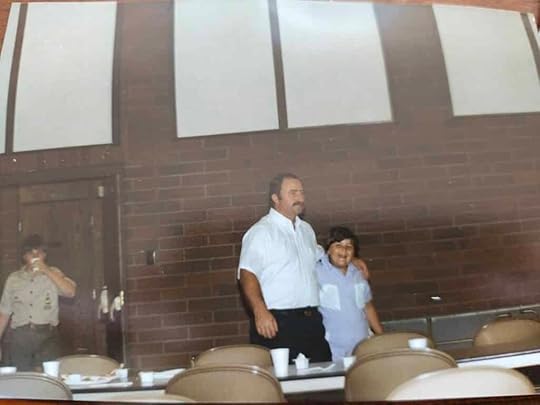 Jen with her dad
Jen with her dadMy parents were often needed at the church building throughout the week. My dad was a scoutmaster, the kind that’s so dedicated they have a campout once a month and there’s always something to attend. When I scrunch my face to remember, the words “arrow of light, eagle’s nest, court of honor, posting the colors” come to mind. As a young girl I was bored out of my mind and would wander through the building and sometimes even run in the halls with other kids. One evening I decided to take a shortcut through the chapel which resulted in an adult scolding me because I had been in the chapel while wearing pants. I was told I always had to be in a dress if I was going to be in the chapel, yes even to go through the dark unlit overflow to get to the other side. My eyes went wide as the adult explained that the sacrament table is where the symbolic body of Christ is laid and blessed. I could not be in its presence without wearing a dress. I silently wondered why Heavenly Father would be mad at me for wearing pants in there when the boys were wearing play clothes too. For the most part I heeded the lesson I was taught that evening. When I broke the rule and went through the darkly lit or empty chapel, I’d feel bad and repent. Even as a grown-up.
Sometime in the 90’s I watched as a sister a few years older than I walked reverently to the pulpit and addressed the congregation. She’d been called to serve a mission for the Lord, a sacrifice she was excited and proud to make. Few obligations remained before she could travel to the missionary training center in Provo, Utah. One of those was an obligation she’d decided to complete with her fellow ward members as witness. She carefully and quietly raised her fingers to her nose and removed her tiny studded piercing. It felt like a really big moment. Collectively the ward exhaled like she had just made a lifesaving, good choice. The energy of that Sunday was ecstatic and everyone smiled and relived the moment as we waited for our classes to begin. How could the removal of such a small adornment create such a huge moment for us all?
I think it was such a big moment because ear piercings alone could lead to being questioned about your level of commitment to the Lord. Girls are counseled to not get piercings unless for medical reasons. If you really desire to have your ears pierced only one “modest” pair would be considered appropriate. When President Hinckley specifically addressed having more than one pair of earrings the message reverberated through rows in young women’s and relief society classes. Keeping more than one modest pair was disobedient and years later Elder Bednar would proclaim “Those who choose to disregard this counsel sow a lack of respect for themselves and for God. They will someday regret their decisions.”
There were many instances in my life when I felt like I had stopped breathing to absorb a new-to-me or changed expectation from church leadership. Fast forward to decades after that first memory to the time I’d talked about the temple with my dad. He was concerned about me and when I came to visit we took my kids to the beach and talked. My toes wiggled nervously in the sand and I struggled to meet his gaze when he asked me how I was feeling about “the church” and if I believed anymore. I asked him the question that had been weighing on my mind ever since receiving my endowment. “Dad, why do I have to hide my face from Heavenly Father if he loves me? What father would want that?” Veiling my face had always made me feel uncomfortable and less worthy than the men filling the rows in on the other side of the room during the endowment. The last session I had attended had been particularly difficult for me and I wasn’t planning on returning to the temple again. “Shhhhh,” my dad said and shook his head. “There are some things we don’t talk about outside of the temple.” I looked down at the sand, unable to keep looking into his eyes. I mumbled something about not knowing what I believed anymore and the conversation changed as we sat on the beach watching my children play in the waves.
When the news spread that women would no longer have to veil their faces during significant parts of the endowment ceremony it hit me like a sneaker wave. Previously, not veiling your face could hold up the entire session and being slow to do it meant receiving stares. Was this change an “Oops actually Heavenly Father doesn’t care if you show your face or not and we just thought he did?” And if that’s the case why wasn’t that changed when so many other things in the endowment ceremony changed over the last century? I didn’t feel a sense of victory or relief when that expectation changed. I felt hurt that my pain was for nothing and not worth acknowledging. There’s no do-over and I ache for those who hold memories like mine, of veiling their beloved grandmothers or other loved sisters before closing their casket lid. I mourn every woman buried with her face hidden, whose identity of divine worth felt diminished by this practice.
Outside of Mormonism, if a man told a large group of people including many women to not ““wander around looking like men, put on a little lipstick now and then and look a little charming” I dare to think the collective reaction would be shock, maybe even people walking out. When Elder Ballard said this from the pulpit, a collective laugh resounded throughout the chapel. Why was the reaction one of laughter? Years or decades of coercive expectations created that sound of laughter. Laughter that no doubt hid embarrassment, shame, self-loathing, and more.
For the health of our bodies, of our minds, and of our spirits, I hope that the brethren will someday understand that women can create expectations for themselves and trust that they understand their relationship with the Lord and His will. Stop counting earrings or telling women to wear lipstick. Women are of divine worth, don’t gatekeep it with inconsistent expectations.



